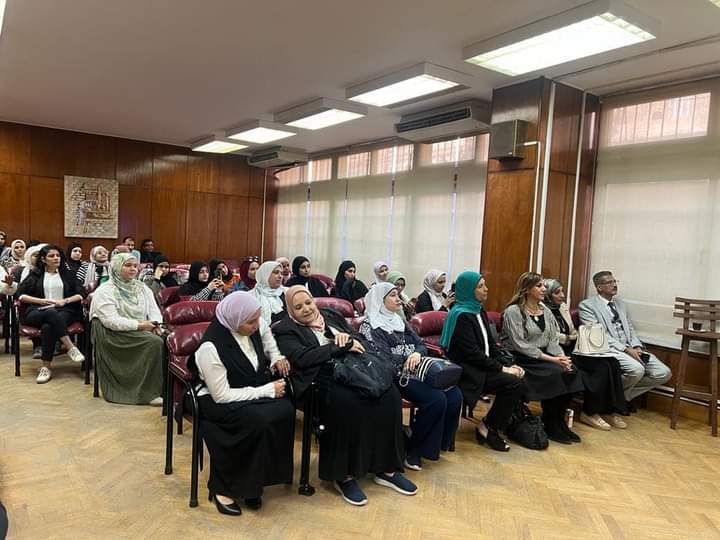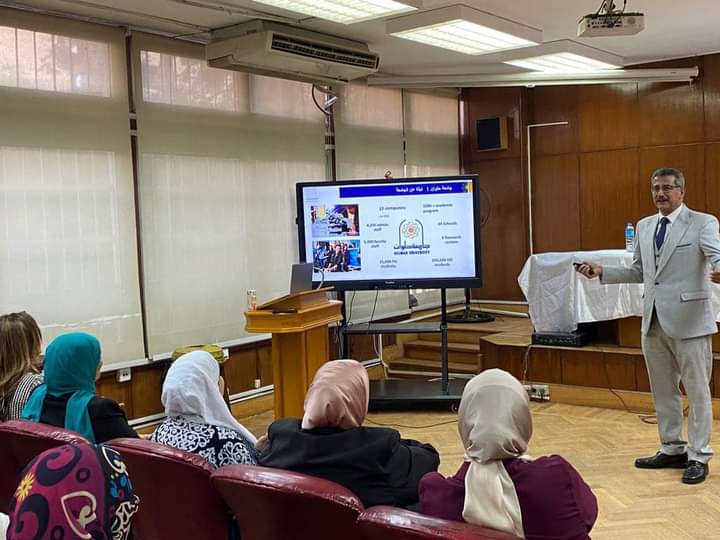Interdisciplinary Research, Reality and the Future... A symposium at the Faculty of Girls
The Community Service and Environmental Development Sector at the Faculty of Girls, at Ain Shams University, in cooperation with the Zoology Department, organized a symposium entitled “Interdisciplinary Research, Reality and the Future,” under the patronage of Prof. Mohamed Diaa Zain El-Abedeen, President of the University, Prof. Ghada Farouk, Vice President of the University for Community Service and Environmental Development, and Prof. Amira. Youssef, Dean of the Faculty, and Prof. Heba Barakat, Vice Dean of the Faculty for Community Service and Environmental Development Affairs.
The symposium was presented by Prof. Mohamed Abdel Moneim Dakhil, Professor of Molecular Parasite Biology, Director of the Center for Environmental Research and Studies, and his distinguished research team: Prof. Nisreen Ahmed Helmy Muhammad, Professor of Piano and Accompaniment, at the Faculty of Music Education, at Helwan University, Prof. Asst. Dr. Afaf Mahmoud Abd Rabbo, Assistant Professor, Department of Physics, at the Faculty of Science, at Helwan University.


The symposium addressed several points, including the importance of merging different specializations with each other, leading to the emergence of a new specialization capable of solving various problems, such as the merging of archeology with parasitology, which resulted in knowledge of the history of an entire people, and the importance of merging the media with the law, with computers and information, to solve the problem of electronic crimes, and the importance of integrating medicine, chemistry and entomology through forensic entomology, thanks to which it is possible to know the place of death and the number of days that have passed after death by analyzing the insect larvae found on the body of the deceased.
A distinguished research project entitled “Crop Response to Piano Music and Sound Frequencies as a Sustainable Agricultural Practice to Mitigate the Effects of Climate Change” was also presented. The most important thing that was covered in the research project is that there are 51 types of music, each type has its own characteristics, and there is a secondary role for music, which is entertainment, and there is a main role for music, which is physical and psychological treatment (music therapy), and there are certain musical frequencies that can have positive effects on The body is called Solfeggio frequencies. Music also promotes relaxation, reduces stress, improves concentration, and repairs DNA damage.
In addition to the importance of music for plants, which is to strengthen the plant's immune system, sound frequencies can affect germination rates and increase plant growth, and plants respond to sound waves and vibrations by moving plant cells, which leads to more formation of nutrients.
In conclusion, sincere thanks were given to the professors of Helwan University, and a certificate of appreciation was presented to Professor Dr. Mohamed Abdel Moneim Dakhil and his distinguished research team.
The symposium was attended by a number of faculty staff and teaching assistants from various specializations and a number of female students who praised the importance of the symposium and its close connection to the field of work, and some souvenir photos were taken.


.svg)




